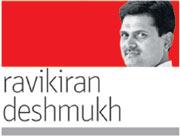Intense speculations over CM Prithviraj Chavan’s ouster proved to be a damp squib, leaving his political detractors high and dry
 Intense speculations over CM Prithviraj Chavan’s ouster proved to be a damp squib, leaving his political detractors high and dry.
Intense speculations over CM Prithviraj Chavan’s ouster proved to be a damp squib, leaving his political detractors high and dry.
ADVERTISEMENT
A sustained campaign that began after the Lok Sabha poll results has achieved nothing for those who were arguing that Chavan couldn’t ensure a win for the ruling Congress-NCP Democratic Front government. The group within and outside the Congress that was seeking his scalp must now be a flustered lot.
Now, as announced by the AICC general secretary and state in-charge, Mohan Prakash, Chavan will lead the Congress for the upcoming state assembly elections. But, a very interesting situation has emerged. The group of Congress and the NCP men who had serious reservations about Chavan are now expected to work with him.
In an indication of discord between the two parties, NCP supremo Sharad Pawar has snubbed Chavan’s claims that he (Chavan) was indeed offered leadership for the coming elections by senior party leaders in Delhi, and said that Chavan was never even part of the three meetings held with them. The atmosphere of distrust may not go away easily, and this will be crucial for the alliance that seeks a popular mandate for the fourth time in a row.
It is no longer a secret that apart from the NCP, a section within the Congress, comprising ministers such as Narayan Rane, Radhakrishna Vikhe Patil, ex CM Ashok Chavan and the legislators close to him, were trying to impress upon Congress leadership a necessity for change in the state’s leadership.
After Chavan received AICC’s support, it remains a mystery as to what happened to the issues raised by these sections. These leaders may not exhibit their displeasure openly, barring Narayan Rane, who is not known to mince words. His supporters say he is unlikely to contest assembly elections, too.
It is also said that Chavan’s removal was a pre-condition put forward by NCP, if it had to agree to merge with the Congress. The NCP is convinced that Chavan has always sought to weaken their base. He has also left NCP leaders to face scam charges, instead of defending a political ally.
So, it won’t be surprising if the NCP decides to contest the assembly polls on its own. In 1999, NCP and Congress came together only after the general elections to form the government. This time, the NCP might take a different stand, as it is refusing to tow Congress’s line in Parliament also.
This was evident when Pawar refused to vote against an amendment bill to facilitate the appointment of Nripendra Mishra, the principal secretary to PM Narendra Modi. Now that Chavan is going to lead the alliance, it’s not just his detractors in NCP - a divided house in his own party waits for him.
Recent developments have made it clear that the Mumbai Regional Congress Committee (MRCC), headed by Janardhan Chandurkar, is unwilling to co-operate with the Maharashtra Pradesh Congress Committee (MPCC), led by Manikrao Thakre.
MRCC didn’t participate in Lok Sabha review meetings organised by MPCC at Tilak Bhavan in Prabhadevi; instead, it convened its own separately at the Azad Maidan office. MRCC went solo with the agitations against the rail fare hike and inflation, even though its parent body was demonstrating all across the state. Such a show does not augur well for the Congress at a time when it’s trying to keep its house in order.
MRCC’s open defiance speaks volumes about the mood within the party. Chandurkar is known to be close to ex MP Gurudas Kamat, but their relations, too, have soured in recent times. It is said that ex Congress MPs Kamat, Sanjay Nirupam and Priya Dutt are keen to take over the reins of Mumbai Congress.
There are differences over the way Chandurkar got his name cleared as the Governor’s nominee on the State Council, when Kamat was strongly lobbying for one of his staunch loyalists. It must also be noted that Chavan’s relations with MPCC chief Thakre and state in-charge Mohan Prakash are not very cordial, which was evident during the Lok Sabha elections. Chavan, and by extension, the Congress, has tough days ahead.
The writer is Political Editor of mid-day
 Subscribe today by clicking the link and stay updated with the latest news!" Click here!
Subscribe today by clicking the link and stay updated with the latest news!" Click here!







